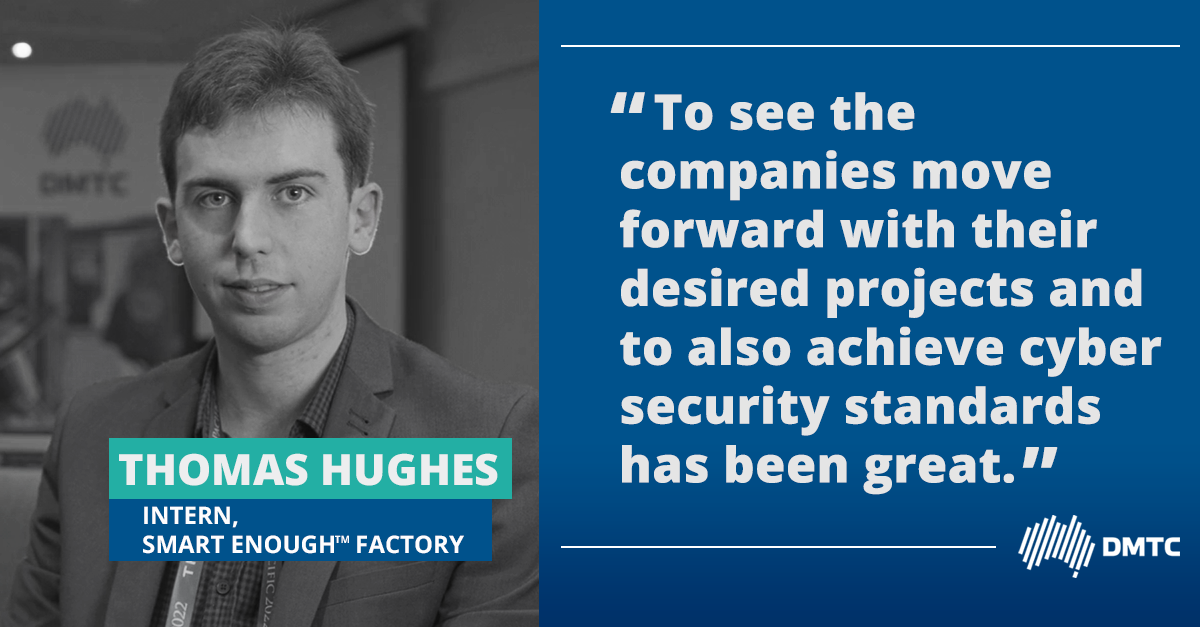Supporting interns to build Australia’s sovereign capability
Through our Education portfolio, DMTC is committed to boosting the pipeline of young, innovative Australians progressing from academic study to employment in defence industry and related fields – investing in the future workforce necessary to develop Australia’s defence industrial base. DMTC’s Industry Capability Development program proudly supports internship opportunities for undergraduate students across engineering, computer science and software development disciplines. These internships provide mutual benefits to both the student and to industry partners as they progress along their digital transformation journey. One of our interns, Thomas Hughes (an undergraduate student at Deakin University), kindly sat down with DMTC to talk about his internship experience and how DMTC’s support has shaped his future career path.
Thomas Hughes – Deakin University
When Thomas, a mechatronic engineering student, first joined DMTC’s Smart Enough™ Factory (SEF) program as an ICD intern, it fuelled an interest to work alongside companies operating at the cutting edge of digital technology and advanced manufacturing. Despite his desire to undertake hands-on work experience, Thomas’s first SEF internship was one of the many activities interrupted by the ongoing COVID-19 pandemic. Once public health restrictions had eased however, Thomas was keen to return to the program and to the factory floor.
Commenting on how excited he was to finally join Melbourne-based companies SEM Fire and Rescue (SEM) and Carbon Revolution, Thomas acknowledged that “being able to meet in person with everyone this time around made a real difference, and being able to show companies the ‘Factory in a Box’ kit dashboard in person has been fantastic for tracking their progress through the project”.
DMTC originally developed the SEF project in response to the specific needs of companies wishing to provide services to the defence industry supply chain to boost their digital literacy and embrace the digitisation of manufacturing. By implementing the ‘Factory in a Box’ kit, participating businesses are provided a practical and low-cost introduction to the value of recording and analysing production data, quantifying the benefits of best practice business systems and factory connectivity, and optimise the performance of their existing equipment to provide additional value to their customers. In Thomas’s words, “It’s been great to work side by side with these companies in the defence and engineering fields. Creating dashboards that feed off the company’s systems allows us to visualise how the business operates, if they’re falling behind in one area or to see where they can improve. This is why the Smart Enough™ Factory can save months and months of time, worth literally millions of dollars, in its implementation into these companies.”
Throughout his internship, Thomas worked closely with SEM and Carbon Revolution to set the scope of their respective Smart Enough™ Factory projects. In the case of SEM, an emergency services vehicles manufacturer with headquarters in Wendouree, Thomas was instrumental in helping to realise the company’s program objectives from the project.
As SEM General Manager Mark Thomas noted, “The SEF program allowed us to develop a real-time problem-solving solution to the visibility of materials within our manufacturing plant, as well as providing critical information to our project supervisors on the status of such materials.”
SEM’s Smart Enough™ Factory project is emblematic of the adaptability of the SEF program’s ‘Factory in a Box’ kit. For Thomas, it highlights the overarching importance of taking an innovative approach to businesses’ unique operational needs. “To me, innovation is being able to design something, but then expand on it to achieve a set goal or objective – like looking at a mind-map where you start with a central idea and then branch out to different paths.”

Regarding his time as an intern, Thomas told DMTC that he “…loved the experience. To see the companies move forward with their desired projects and to also achieve cyber security standards has been great.” He also indicated that this experience has shaped plans for his future career. “Eventually, I would like to move into robotics, moving from creating dashboards to more complete mechanical systems.”
But at least for the time being, Thomas has his hands full. As well as completing his mechatronic engineering studies at Deakin University, Thomas has accepted an offer from SEM to work with them in a part-time capacity. “Thomas has continued to develop some further uses of the SEF tools we retained and he is expanding it into other areas of the manufacturing plant. He is also gaining and providing support to the project management team with expediting and data analytics around material supply, and undertaking 3D printing and laser engraving within our manufacturing support function team,” Mark Thomas explains. “Thomas has brought us much needed up-to-date knowledge and support to our traditional manufacturing plant, and we really appreciate his enthusiasm and contribution.”
With support from the Defence Science Institute and AI Group, DMTC has supported multiple internships across Victoria, New South Wales and Tasmania, with a view to expanding this element of the program across other states and territories. The outcome from this program for Thomas and SEM is a fantastic case study for the benefits of joint investment in Australia’s future sovereign industrial workforce and capability. For Mark Thomas, the takeaway for other Smart Enough™ Factory participants is clear: “I would recommend any participant company to consider what an intern like Thomas can contribute to your organisation.”
Posted by Patrick Crosling on August 26th, 2022 Tagged: DMTC, Education, smart enough factory, students